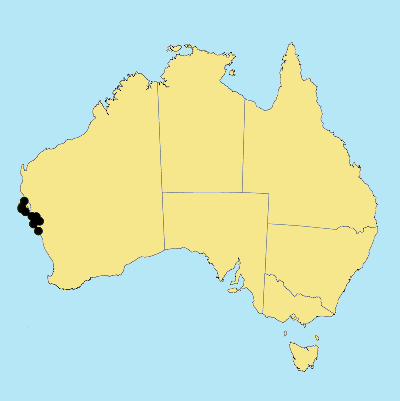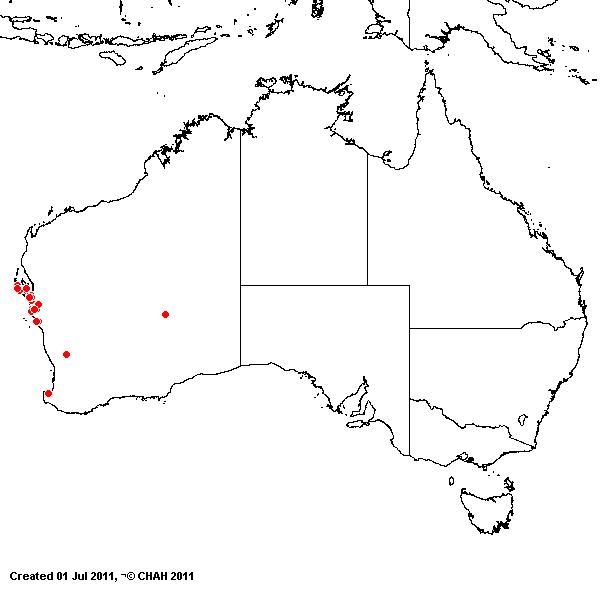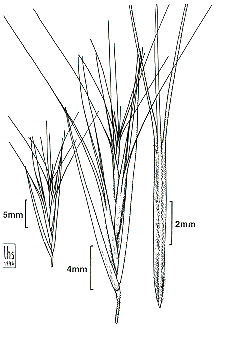Triodia bromoides (F.
Muell.) M. Lazarides. Austral.
Syst. Bot. 10: 417
(1997).
Classification. (GPWG 2001) : Subfamily
Chloridoideae. Triodeae.
Basionym and/or
Replacement Name: Triraphis
bromoides F. Muell., Fragm. 8: 108 (1873).
Type of Basionym or
Protologue Information: Western Australia: South-West Province; Geographe
Bay, A. Oldfield s.n. (HT: MEL, IT: K, PERTH).
Recent synonyms:
Plectrachne bromoides.
Key references
(books and floras): [1878] G.Bentham, Flora Australiensis 7 (604 as Triraphis
bromoides), [1952] C.A.Gardner, Flora of Western Australia 1 Gramineae
(80 as Plectrachne bromoides), [2002] D.Sharp & B.K.Simon, AusGrass,
Grasses of Australia.
Illustrations:
[2005] K.Mallet (ed.), Flora of Australia 44B: Poaceae 3 (Fig.
33A-C).
Habit.
Perennial. Culms erect, 50–150 cm tall. Mid-culm internodes glabrous. Mid-culm
nodes glabrous. Lateral branches simple. Leaf-sheaths glabrous on surface.
Leaf-sheath auricles absent. Ligule a fringe of hairs. Leaf-blades flexuous,
aciculate, conduplicate, 15–23(–60) cm long, 0.8–2 mm wide. Leaf-blade surface
glabrous.
Inflorescence.
Inflorescence compound, a panicle. Panicle lanceolate or oblong, 14–30 cm long.
Spikelets.
Spikelets pedicelled. Fertile spikelets 1 or more flowered, with 1 fertile
floret, comprising 1 fertile floret(s), with diminished florets at the apex,
elliptic, laterally compressed, 12–22 mm long.
Glumes.
Glumes similar. Lower glume linear, scarious or cartilaginous, without keels,
1–3(–5) -nerved. Lower glume surface glabrous. Lower glume apex awned. Upper
glume linear, 17–30 mm long, scarious or cartilaginous, without keels, 1–3(–5)
-nerved. Upper glume surface glabrous. Upper glume apex entire or dentate,
awned.
Florets.
Fertile lemma 6 mm long, without keel or keeled, wingless to winged on margins,
8–15 -nerved. Lemma surface indumented. Lemma apex lobed, awned, 3 -awned.
Median (principal) awn 20–35 mm long overall. Lateral lemma awns present. Palea
2 -nerved. Lodicules present. Anthers 3.
Continental
Distribution: Australasia.
Australian
Distribution: Western Australia.
Western Australia:
Austin. Irwin.
Notes.
Similar to P. drummondii. P. bromoides is distinguished by its
long-awned glumes and lemmas; hairy submargins and midnerve on the lemma;
glumes much longer than the spikelet; hairy palea; sparsely hairy glume
internode; indumentum on foliage and basal culm internodes; large anthers; few
and loosely flowered spikelet.
On
the mainland and coastal islands of the northern South-West Province of W.A. On
sand plains and dunes, and stony rises, in red, grey and calcareous sands;
flowers July-Oct. (winter and spring); fruits July-Oct. (winter and spring).



